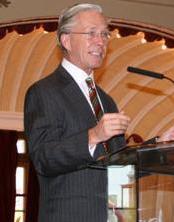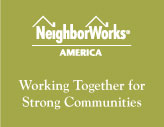
The Home Owners' Loan Corporation (HOLC) was a government-sponsored corporation created as part of the New Deal. The corporation was established in 1933 by the Home Owners' Loan Corporation Act under the leadership of President Franklin D. Roosevelt. Its purpose was to refinance home mortgages currently in default to prevent foreclosure, as well as to expand home buying opportunities.
A homeowner association, or a homeowner community, is a private association-like entity in the United States, Canada, and certain other countries often formed either ipso jure in a building with multiple owner-occupancies, or by a real estate developer for the purpose of marketing, managing, and selling homes and lots in a residential subdivision. The developer will typically transfer control of the association to the homeowners after selling a predetermined number of lots.

Foreclosure is a legal process in which a lender attempts to recover the balance of a loan from a borrower who has stopped making payments to the lender by forcing the sale of the asset used as the collateral for the loan.
Equity stripping, also known as equity skimming, is a type of foreclosure rescue scheme. Often considered a form of predatory lending, equity stripping became increasingly widespread in the early 2000s. In an equity stripping scheme an investor buys the property from a homeowner facing foreclosure and agrees to lease the home to the homeowner who may remain in the home as a tenant. Often, these transactions take advantage of uninformed, low-income homeowners; because of the complexity of the transaction, victims are often unaware that they are giving away their property and equity. Several states have taken steps to confront the more unscrupulous practices of equity stripping. Although "foreclosure re-conveyance" schemes can be beneficial and ethically conducted in some circumstances, many times the practice relies on fraud and egregious or unmeetable terms.
Mortgage discrimination or mortgage lending discrimination is the practice of banks, governments or other lending institutions denying loans to one or more groups of people primarily on the basis of race, ethnic origin, sex or religion.
The Hope Now Alliance is a cooperative effort between the US government, counselors, investors, and lenders to help homeowners who may not be able to pay their mortgages. Created in 2007 in response to the subprime mortgage crisis, the alliance claims to have helped over 1 million homeowners avoid foreclosure through January 2008. Critics of the alliance contend that the assistance provided does not go far enough, and that not enough homeowners are being helped.
The City Bar Justice Center provides pro bono legal services to low-income clients throughout New York City. It is part of the Association of the Bar of the City of New York Fund, Inc., a 501(c)(3) corporation.

Joseph E. Hasten was the President and CEO of ShoreBank, America's first and leading community development and environmental bank founded in 1973 in Chicago, Illinois and named one of Fast Company's 45 Social Entrepreneurs Who Are Changing the World in 2008. Hasten led ShoreBank's socially responsible investing in the under-served urban neighborhoods of Chicago, Illinois; Cleveland, Ohio; and Detroit, Michigan. Previously, Hasten was the vice-chairman of U.S. Bancorp.
Home price protection is an agreement that pays the homeowner if a particular home price index declines in value over a period of time after the protection is purchased. The protection is for a new or existing homeowner that wishes to protect the value of their home from future market declines.
Loss mitigation is used to describe a third party helping a homeowner, a division within a bank that mitigates the loss of the bank, or a firm that handles the process of negotiation between a homeowner and the homeowner's lender. Loss mitigation works to negotiate mortgage terms for the homeowner that will prevent foreclosure. These new terms are typically obtained through loan modification, short sale negotiation, short refinance negotiation, deed in lieu of foreclosure, cash-for-keys negotiation, a partial claim loan, repayment plan, forbearance, or other loan work-out. All of the options serve the same purpose, to stabilize the risk of loss the lender (investor) is in danger of realizing.
Loan modification is the systematic alteration of mortgage loan agreements that help those having problems making the payments by reducing interest rates, monthly payments or principal balances. Lending institutions could make one or more of these changes to relieve financial pressure on borrowers to prevent the condition of foreclosure. Loan modifications have been practiced in the United States since the 1930s. During the Great Depression, loan modification programs took place at the state level in an effort to reduce levels of loan foreclosures.
The Homeowners Affordability and Stability Plan is a U.S. program announced on February 18, 2009, by U.S. President Barack Obama. According to the US Treasury Department, it is a $75 billion program to help up to nine million homeowners avoid foreclosure, which was supplemented by $200 billion in additional funding for Fannie Mae and Freddie Mac to purchase and more easily refinance mortgages. The plan is funded mostly by the Housing and Economic Recovery Act. It uses cost sharing and incentives to encourage lenders to reduce homeowner's monthly payments to 31 percent of their gross monthly income. Under the program, a lender would be responsible for reducing total monthly mortgage payments (PITI) to no more than 38 percent of the borrower's income, with the government sharing the cost to further reduce the payment to 31 percent. The plan also involves potentially forgiving or deferring a portion of the borrower's mortgage balance. Mortgage servicers will receive incentives to modify loans and to help the homeowner stay current, though participation by lenders is voluntary.
Open Communities (formerly Interfaith Housing Center of the Northern Suburbs) is a nonprofit organization that advocates for fair and affordable housing in 17 northern suburbs of Chicago. Open Communities' mission is to educate, advocate, and organize to promote just and inclusive communities in north suburban Chicago. Open Communities works with current and prospective residents and local groups to promote economically and culturally diverse communities. Free services include fair and affordable housing counseling services, community education, advocacy, and organizing for welcoming communities.
American Homeowner Preservation is an online real estate crowdfunding platform which purchases pools of nonperforming loans from banks and other lenders and then offers borrowers who want to stay in their homes debt restructuring options with reduced payments and discounted principal balances. If homes are vacant or families want to move, AHP offers deficiency waivers and incentive payments to cooperate with short sales in order to put the homes back into service.
A loan modification company, also known as a mortgage modification company, is a business that helps homeowners modify the terms of their home loans or mortgages. When a mortgage is modified, the original terms of the home loan contract between a lender and a borrower are renegotiated and then altered, usually in the favor of the borrower.

MorningSide is a neighborhood on the east side of Detroit, Michigan. The area is bounded by Harper Avenue and Interstate 94 on the north, Mack Avenue to the south, East Outer Drive and Whittier on the east and Alter Road and East Outer Drive to the west. The local association that shares the name MorningSide with the community is a collaboration of residents working together to take care of this area.

The Neighborhood Reinvestment Corporation, doing business as NeighborWorks America, is a congressionally chartered nonprofit organization that supports community development in the United States and Puerto Rico. The organization provides grants and technical assistance to more than 240 community development organizations. NeighborWorks America provides training for housing and community development professionals through its national training institutes. Since 2007, NeighborWorks America has administered the Congressionally created National Foreclosure Mitigation Counseling Program.

Occupy Homes or Occupy Our Homes is part of the Occupy movement which attempts to prevent the foreclosure of people's homes. Protesters delay foreclosures by camping out on the foreclosed property. They also stage protests at the banks responsible for the ongoing foreclosure crisis, sometimes blocking their entrances. It has been compared to the direct action taken by people to prevent home foreclosures during the Great Depression in the United States.

Occupy Minneapolis (OccupyMN) is a grassroots collaboration that began in October 2011 with a series of demonstrations in Minneapolis, Minnesota. Protesters have staged numerous occupations, most notably of the Hennepin County Government Center plaza.
The Making Home Affordable program of the United States Treasury was launched in 2009 as part of the Troubled Asset Relief Program. The main activity under MHA is the Home Affordable Modification Program.






